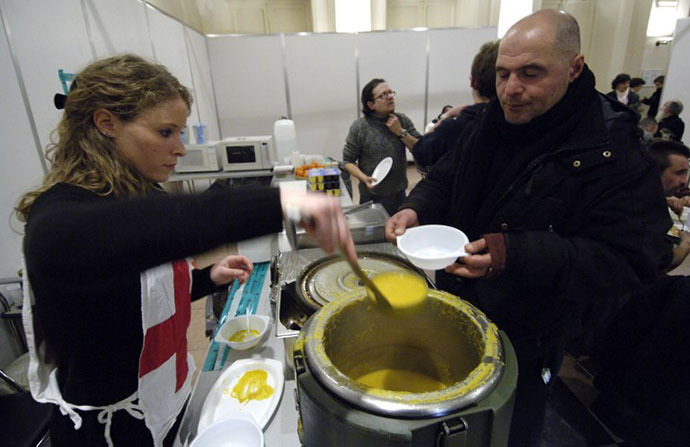‘European social safety net eroded’: ICRC shocked by accumulated poverty data
Published time: December 05, 2013 02:52

The European Red Cross and Red Crescent societies are seeing a worrying poverty trend across the continent, in some areas reaching WWII proportions, Anitta Underlin, European director of the Red Cross told RT.
RT: Poverty has struck the European Union – about 43 million people suffer from material poverty. Why is the crisis so severe now?
Anitta Underlin: What we have seen since we did our first survey in 2009 and until 2013 is that the crisis is really taking root at the community level, at individual level and at household level to a different degree.
Because people today have used all of their savings, there is nothing left. Government budgets have been cut because government power is also under threat from the crisis. And that means that the whole security net to help the people is really getting eroded.
RT: What is the Red Cross doing to ease the situation?
AU: The Red Cross national societies across Europe – and we are present in 52 countries in the whole West Europe and East Europe – are responding with different measures. One of the very classical Red Cross/Red Crescent response mechanisms is the distribution of food, which has been increased by 75 percent since 2009.
And the reasons why food has been distributed in so many countries, including the EU countries, is that people often, even with small incomes will use all of their available funding to pay for their housing, electricity bill, heating bill and then when it comes to buying food for themselves and their children there is simply nothing left. And many of these families are surviving upon the assistance from the Red Cross/Red Crescent.

AU: Of course as we always say, it is very difficult to predict the future but what we know is that we are seeing a rapid decrease in what we call the middle class people. Basically in countries like Romania, like in Serbia where the middle class over the last period has been 20 percent. Today, when we measure it, is 10 percent. And that gives us an impression of how many people, who had fought their way to become the middle class in today’s society, now are falling back. And that is of course a worrying tendency that we see: the middle class that we know is the survival of society is getting reduced rapidly.
Read More Here
..........
Mirror
Austerity Britain: One in four Britons have gone hungry in last year
- By Ruki Sayid
Parents are skipping meals so kids can eat, a study finds, while 40% of
households find it harder to put a meal on the table than a year ago
A quarter of Brits have gone hungry in the last 12 months because they were broke, a study reveals today.
And parents are skipping meals so their kids can eat, it found – while 40% of households now find it harder to put a meal on the table than a year ago.
Soaring energy bills will force a third of families to choose between heating or eating this winter, says the report by food bank charity the Trussell Trust and store giant Tesco.
It also says two-thirds now in food poverty will endure freezing homes to save cash so they can eat a hot dinner.
The trust estimates that 60,000 people, including 20,000 children, will need emergency rations over the two-week Christmas break.
Read More Here
..........
UK embarks on biggest food drive since second world war
60,000 people to receive help over festive season as ministers reject claim of link to welfare changes

Shopper Betty Clark
donates cereal to volunteers including singer Rebecca Ferguson at Tesco
in Kensington, west London. Photograph: John Phillips/PA
The reality of the UK's cost of living crisis has come under the spotlight this weekend as Britain embarks on its biggest charity food drive since the second world war, with the aim of collecting tonnes of groceries to give to hungry and penniless families over Christmas.
The effort involves the British Red Cross (BRC) – the first time the charity has been engaged in mass food aid collection in the UK since 1945 – working alongside the Neighbourhood Food Collection, which has been set up by the Trussell Trust food bank network, the food aid distribution charity Fare Share and Tesco.
Each of Tesco's 2,500-plus UK stores is asking customers on Friday, Saturday and Sunday to buy extra food essentials such as pasta, rice and cereal to give to the charities.
Charities said the US-style food drive was a response to increasing concerns about the rise in food poverty. "The deeply distressing reality for Britain this Christmas is that thousands of families will struggle to put food on the table," said the Trussell Trust's chief executive, Chris Mould. "We're already meeting parents who are choosing between eating and heating, and rising fuel prices mean that this winter is looking bleak for people on the breadline."
The trust blames benefit delays, low pay, rising living costs and the so-called bedroom tax for a tripling in food bank use over the past year. It said about 60,000 people were likely to receive emergency food from Trussell Trust food banks in the two weeks over Christmas alone, including 20,000 children.
Ministers have rejected the claim, saying there is no robust evidence of a link between welfare reform and increasing food bank use.
Over 23,000 volunteers will be involved in the food drive, including 500 BRC volunteers. Juliet Mountford, BRC director of UK service development, said the charity had decided to get involved because it found food poverty an increasingly prevalent aspect of its core work helping elderly people to live independently.
Read More Here
..........









No comments:
Post a Comment
Hello and thank you for visiting my blog. Please share your thoughts and leave a comment :)